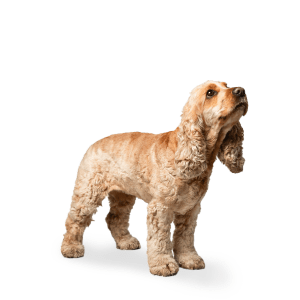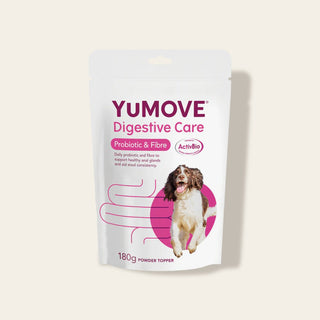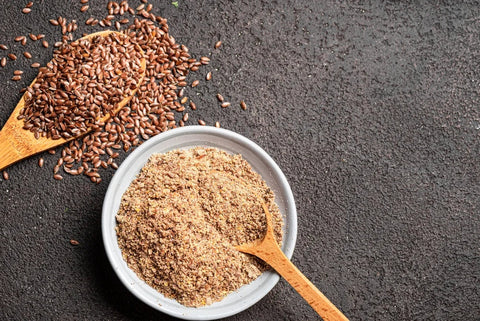

Best probiotics for dogs: Comparing pastes, powders, treats and more
If your dog has a sensitive tummy, you’ve likely explored all sorts of ways to support their digestion. Maybe you’ve tried special diets or adjusted their routine. But did you know that dog digestive probiotics can also play a helpful role?
These live microorganisms can support your dog’s digestive system by helping to keep things regular after a tummy upset and supporting healthy stool texture. And of course, if you have any concerns about your dog’s digestion, it’s always a good idea to speak to your vet.
What are probiotics for dogs?
Probiotics are live microorganisms that can help maintain the natural balance of bacteria in your dog’s gut. While they’re often linked with foods like yoghurt in human diets, the strains used in dog supplements are specially developed for pets.
One example is Enterococcus faecium (found in the YuMOVE Digestive Care range), which helps top up your dog’s good bacteria. These supplements can be helpful for supporting healthy digestion every day – especially if your dog has recently experienced changes to their diet, stress or mild digestive concerns.
If you’re asking yourself ‘are probiotics good for dogs’, the answer is that they can be. When used appropriately, they can help support digestive health and maintain a healthy balance in the gut.

What is a good probiotic for dogs?
Not all probiotics are the same, and different formats can work better for different dogs. Whether you’re looking for powders, pastes, tablets or chewable bites, it often comes down to what your dog will happily take – and what suits their daily routine.
At YuMOVE, you’ll find a range of options including our new YuMOVE Anal Gland Health supplement – our new probiotic bites for dog anal gland support. Let’s take a closer look at each format to help you choose the right fit for your dog.
Probiotic powders
Dog probiotic powders – such as YuMOVE Digestive Care Probiotic & Fibre (which contains other gut-supporting ingredients alongside probiotics, such as fibre) – are easy to sprinkle over food and can also be mixed with a little water to make a paste. This makes them especially useful for dogs who aren’t keen on tablets.
Pros:
- Easy to mix into meals
- Can be given dry or made into a paste
- Great for dogs who avoid tablets
Cons:
- May not suit fussy eaters if they detect a change in taste
- Requires measuring each time
Probiotic tablets
Probiotic tablets – like YuMOVE Digestive Care Pre & Probiotic (which contains other gut-supporting ingredients alongside probiotics, such as prebiotics) – are a convenient way to provide a consistent amount of probiotic. Some dogs will happily take them as a treat, while others may need them hidden in food.
Pros:
- Simple to give with food or directly
- Each tablet delivers a set amount
Cons:
- May not be suitable for dogs who dislike tablets
- Harder to mix into food compared to powders or pastes
Probiotic pastes
A probiotic paste for dogs can be especially helpful during periods of digestive upset. The fast-acting ingredients in YuMOVE Digestive Care Rapid are designed to get to work quickly to support your dog’s digestive health.
Pros:
- With fast-acting ingredients to support loose stools
- Syringe makes it easy to measure
- Useful during times of digestive imbalance
Cons:
- Designed for short-term use only – not a long-term solution
- Some dogs may dislike the texture
Probiotic bites
Probiotic dog treats like our YuMOVE Anal Gland Health Bites are a tasty and convenient option. Many dogs enjoy them as part of their daily routine – ideal for pet owners looking for simplicity. These bites also contain other gut-supporting ingredients, such as prebiotics and fibre, alongside probiotics. Read our guide to the benefits of fibre for dogs.
Pros:
- Chewable format makes them feel like a treat
- Great for dogs who refuse tablets
- Easy to remember as part of a routine
Cons:
- Not suitable for dogs with specific dietary restrictions
- May be tricky if your dog doesn’t like the flavour
When to see a vet
If your dog shows ongoing signs of digestive upset, such as loose stools, reduced appetite or changes in behaviour, it’s always best to speak to your vet. They’ll be able to check for any underlying concerns that may need attention.
You should also speak to your vet before introducing any new supplements, especially if your dog is on other products or has ongoing digestive concerns.
The takeaway
Probiotics can play a helpful role in supporting your dog’s digestion – whether they prefer powders, pastes, tablets or chewable bites. They can be a simple way to support gut health, especially during or after periods of stress or dietary change.
As always, if you're unsure whether probiotics are right for your dog, speak to your vet first. And if you’d like to explore more expert advice on everything from digestive concerns to general wellbeing, take a look at our Health Guides for expert advice on pet care.



